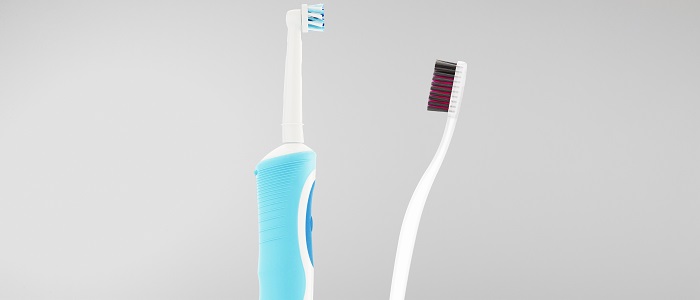One of the most common questions we get at the dentist’s office is whether you should use an electric or manual toothbrush when brushing your teeth. For the most part it’s a matter of personal preference. Both types of toothbrush are equally effective at cleaning teeth, and each type comes with its own pros and cons. In this blog post, we’ll detail some information about electric and manual toothbrushes to help you make your own decision.
Manual Toothbrushes
Pros:
- Easy to use
- Doesn’t need power or charging
- You have more control over your brushing
- Cheap
Cons:
- Requires good technique for most effective cleaning
Manual toothbrushes are a classic dental health accessory. If you’ve ever been to a dentist, you probably know the proper technique (and if you don’t, be sure to ask us on your next visit!). They’re cheap, portable, and easy to use. But, you do need to use good technique to get the most effective cleaning for your teeth. If you find it difficult to maintain proper technique, or if you have mobility issues that affect your manual dexterity, then an electric toothbrush might be a better choice for you.
Electric Toothbrushes
Pros:
- Cleans better
- Easier to use
- Easier for people with limited mobility
- Studies show that they are better at removing plaque
Cons:
- Need to keep it charged
- More expensive
Electric toothbrushes are a popular choice because they take a lot of work out of brushing your teeth. The spinning motion of the brush head ensures a proper circular brushing technique, and you just need to hold the brush at the right angle – the brush does the rest of the work. This also makes it a better choice for people with mobility issues that affect how well they can use their hands. Studies have also shown that electric toothbrushes are more effective at removing plaque – although both manual and electric toothbrushes are equally effective at cleaning if you use the proper technique with a manual toothbrush.
The downside of electric toothbrush comes down to cost and maintenance. Manual toothbrushes are cheap and don’t require any special maintenance other than a good rinse after you brush. Electric toothbrushes can be an expensive investment up front. Once you get the main unit, replacing electric toothbrush heads is about as expensive as buying a new regular toothbrush every once in a while. Electric toothbrushes also require batteries or recharging, which you don’t have to worry about with a manual toothbrush.
Product Recommendations
For manual toothbrushes, any brand will do. The most important thing to consider is bristle softness. The most common degrees of softness are extra soft, soft, and medium. “Soft” is the best choice for most people – it’s firm enough to clean your teeth, but soft enough where it won’t harm your gums.
For electric toothbrushes, we recommend using either an Oral B brand or Sonicare brand electric toothbrush. Both are good choices. However, Sonicare brushes are a little stronger, which can cause issues with sensitive teeth.
Wrap Up
We hope you found this breakdown of manual and electric toothbrushes helpful. If you have any questions about tooth brushing technique, or you need some more detailed product recommendations, be sure to ask during your next visit!

